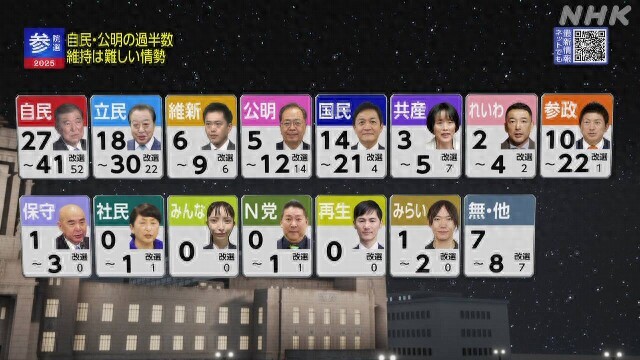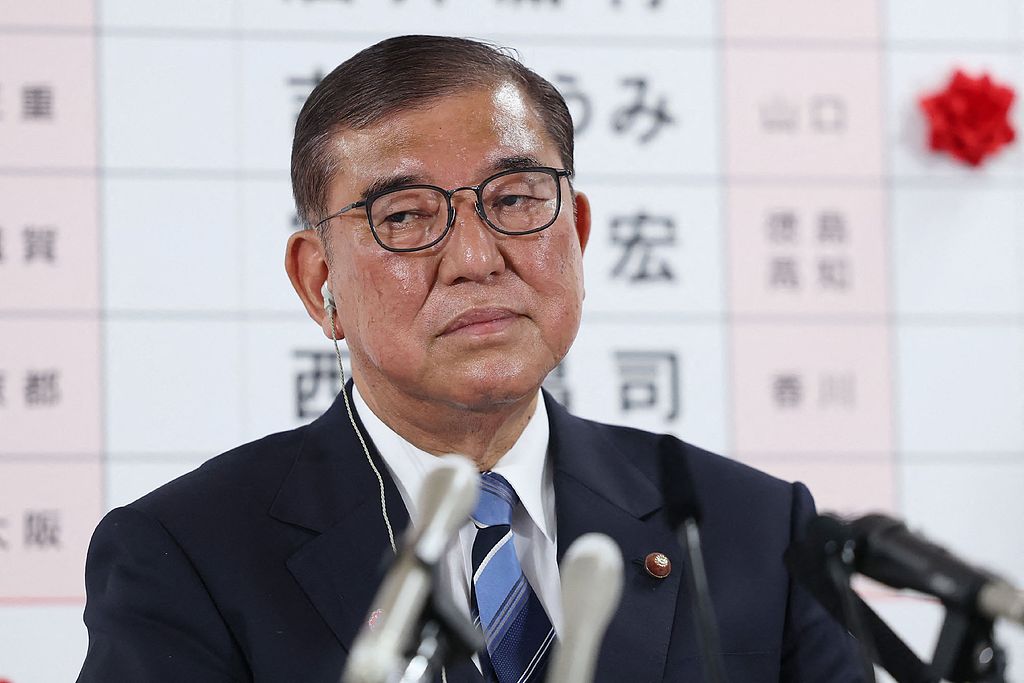【Text by Observer Net, Shao Yun】
On July 20, the 27th House of Councillors election in Japan completed voting. Japanese media announced exit poll results on the evening of the 20th, which suggested that the ruling coalition of the Liberal Democratic Party (LDP) and Komeito had "already seen a significant reduction" in seats, making it difficult to achieve its goal of maintaining a majority. The position of Prime Minister Ishiba Sho, who took office just last October, may once again be in jeopardy.
Another Setback
According to the information, the House of Councillors has a total of 248 seats, with members serving six-year terms, and half of them are re-elected every three years. This House of Councillors election involves the contest for 125 seats, including 124 seats up for re-election and one seat for a by-election. Currently, the LDP led by Ishiba and Komeito have 75 seats in non-renewable positions, meaning the two parties need to win at least 50 seats this time.
As of 12:00 AM on the morning of the 21st (11:00 PM Beijing Time on the evening of the 20th), according to NHK's early vote count, the LDP won 35 seats, and Komeito won 6 seats, with 17 seats still undetermined.
Earlier on the evening of the 20th, Japan Broadcasting Corporation (NHK) jointly with Yomiuri Shimbun and Nippon Television (NNN) conducted an exit poll at about 1,700 polling stations across Japan, covering approximately 140,000 voters (62% of the total electorate). The exit poll indicated that the LDP-Komeito coalition is expected to gain between 32 and 51 seats. Other television networks' predictions suggest that the ruling coalition might secure between 41 and 43 seats.
TBS News predicted on the evening of the 20th that the LDP would only win 33 seats in this election, which would mark its worst performance since 1989 when it won 36 seats. If this were the case, the LDP would face a "historic major defeat," and Japan would experience its first post-war situation where the ruling party is a minority in both houses of the Diet.
Japan's Kyodo News also reported on the evening of the 20th that its exit poll results showed that the LDP was locked in a tough battle in 32 single-member constituencies nationwide, and it was already clear that the ruling party could not ensure more than half of the re-elected seats. As for the opposition parties, the Constitutional Democratic Party may increase from 22 seats before the election to 18-30 seats; the National Party is expected to gain 14-21 seats; and the populist conservative political party, which has been controversial recently, is expected to increase its seats from 2 to double digits.

NHK's exit poll results from Japan Television
Reuters said this would be another setback for the ruling coalition, following its worst performance in the House of Representatives election last October in 15 years. Japanese media pointed out that this would also be the first time since the LDP was founded in 1955 that the ruling party failed to secure a majority in both chambers. Additionally, if the total number of seats for the LDP and Komeito falls below 46, it could set a new low since the two parties formed a coalition government in 1999.
The Asahi Shimbun noted that with consecutive electoral defeats, calls within the LDP for Ishiba to step down will further intensify.
Ishiba Shō: Continue to Govern
Kyodo News evaluated on the 20th that this reflects public criticism of the current ruling coalition's high price measures. A core issue that Japanese voters are focusing on is the rise in consumer prices, especially the sharp increase in rice prices.
"In this election, the LDP was basically on the defensive, and it took the wrong stance on key public opinion issues," David Boling, a director at Eurasia Group, added. Polls show that most families want to lower the consumption tax to cope with inflation, but the LDP opposes this, which gives the opposition parties an opportunity for counter-propaganda.
Under the pressure of electoral losses, the decline in cohesion of Ishiba, as the head of the LDP, is inevitable. Japanese media expects that voices calling for accountability of the prime minister may strengthen, and Ishiba's future will become a focal point.

July 20, 2025, Tokyo, Japan - Japanese Prime Minister Ishiba Shō meets the media at the headquarters of the Liberal Democratic Party in Tokyo, responding to the results of the House of Councillors election. Visual China
A recent public opinion survey conducted by Kyodo News from the 11th to the 14th showed that the support rate for Ishiba's cabinet fell by 6.2 percentage points compared to last month, reaching only 20.8%, setting a new low since the cabinet was established last October; the disapproval rate rose by 6.6 percentage points to 55.0%, the highest since he took office.
The report stated that among the reasons for choosing "not supporting the cabinet" (multiple choices allowed), the largest proportion, 29.7%, chose "not seeing hope," while 21.9% selected "lack of leadership," and 21.6% considered Ishiba's policies poor.
In Japanese politics, a cabinet support rate below 30% is considered entering the "danger zone"; if it further drops below 20%, it is regarded as entering the "resignation zone." Japanese media openly stated that Ishiba's governance will become more difficult in the future. In order to form a majority for the budget and bills, the LDP and Komeito will continue to explore ways to attract some opposition parties, but it is hard to predict whether they can get assistance. The Constitutional Democratic Party will strengthen its efforts to achieve a change of government.
On the 21st, Ishiba is expected to hold a press conference regarding the results of the House of Councillors election. According to reports, before the press conference, the LDP plans to hold a special senior meeting to summarize the House of Councillors election. Ishiba will meet with the leader of Komeito, Saito Tetsuo, to discuss the way of joint governance.
On the evening of the 20th, Ishiba told NHK that he intended to continue governing, saying, "We must deeply realize our responsibilities." Ishiba stated that the counting was still ongoing, so it was inappropriate to make hasty statements, but the LDP remained the largest party, and Japan faces issues such as rising prices, slowing growth, and increasingly severe security environments, all of which are challenges that must be addressed.
Rise of Populist Parties
Aside from long-standing issues like prices and the hot topic of US-Japan tariff negotiations, an important trend that emerged in this election was the issue of "preferential treatment for foreigners," which was introduced into the public discourse for the first time. A populist party that advocates "Japanese priority" was even considered one of the big winners of the night by Reuters.
According to the exit poll results from NHK and others, the populist party, which previously had only one seat, is expected to win 10 to 15 seats this time. Although the absolute number is not large, it is likely to further weaken Ishiba's fragile minority government. According to a survey released by Kyodo News on the 16th, the populist party became the third most popular choice among voters. Analysts believe that the strong performance of the populist party may reshape the Japanese political landscape.
Reuters introduced that the populist party was founded in April 2020 and originated from a group that spread conspiracy theories about vaccines during the pandemic. It then gained one seat in the 2022 House of Councillors election, entered the Diet for the first time, and obtained three seats in the previous House of Representatives election. However, before this House of Councillors election, the party gradually expanded its appeal, strongly criticized immigration policy, and brought originally marginal political views into the mainstream.
From the perspective of The Guardian, the populist party's positions have indeed resonated to some extent with the Japanese society at present: due to global inflation and the depreciation of the yen, especially the rise in food prices, Japanese people are experiencing the pressure of living costs. As of June this year, the price of rice in Japan has almost doubled, triggering a political crisis and leading to the resignation of a cabinet minister.
The report pointed out that because wage increases have not kept pace with the rise in prices, the original expectations of the Japanese people for a slow but stable economy have been replaced by the reality of living pressures and pessimism about the future. Low-income groups are hit first, and the populist party has attracted a large number of supporters from this group.
"Many of the supporters of the populist party are first-time voters, who are dissatisfied with the mainstream parties and believe that the mainstream parties have no benefit for them," said Michael Cucek, a Japanese politics expert at Temple University in Japan.
The leader of the populist party, Kamiya Muneo, has publicly stated that his political style is inspired by Trump. The populist party's campaign platform advocates returning to traditional family values, abolishing the "Act on Promotion of Understanding Regarding LGBT," "protecting Japan's unique cultural heritage," restricting immigration, providing 100,000 yen per month for each child, and stopping welfare benefits for non-Japanese citizens.

The leader of the populist party, Kamiya Muneo, Tokyo Shimbun
It is understood that concerns about "preferential treatment for foreigners" stem from Japan's recent relaxation of its previously strict immigration policies to address labor shortages caused by population decline and aging. Last year, the number of foreign residents in Japan reached a new high of 3.8 million, accounting for 3% of the total population.
Despite the labor shortage, most Japanese accepted the necessity of introducing foreign laborers. However, for a country that is highly homogeneous and emphasizes cultural consistency, the influx of a large number of foreigners still triggered a certain level of anxiety. "The 'anti-foreign sentiment' that was once considered taboo is now being openly expressed," said Jeffrey Hall, a lecturer at the Kanda University of International Studies in Tokyo, who studies right-wing politics in Japan.
However, what worries observers is the spread of false information online in Japan. On recent Japanese social media, claims such as "Chinese people receiving livelihood protection benefits have doubled in five years," "one-third of welfare recipients are foreigners," and "foreigners owe 40 billion yen in medical insurance fees annually" have been circulating. Many Japanese media outlets and even officials have denied these claims.
Tetsuya Kataoka, an employee at a company in Tokyo, embodies the hesitation of some voters toward foreigners. Due to a lack of staff, Kataoka was forced to work overtime. He admitted that Japan's economy needs more immigrants to maintain operations, "but I am also economically struggling. When people hear that foreigners are also receiving benefits—despite the low proportion—they think: Why aren't we getting tax cuts instead of giving money to them?"
Kamiya said last week that the populist party's goal in this House of Councillors election was to secure at least 20 seats. According to Cucek's analysis, even if the populist party ends up gaining only 10 to 15 seats as per the exit polls, it would be sufficient to influence policy direction. The LDP and other center-right parties have already promised to handle foreigners more strictly in response to the rise of the populist party.
He also said that if Ishiba's government suffers a major defeat, not only would the prime minister's position be at risk, but a large number of conservative voters within the LDP would also shift to the populist party. This would cause a "severe political shock," potentially ending the LDP's rule that has lasted since 1955.
This article is an exclusive contribution from Observer Net, and any reproduction without permission is prohibited.
Original: https://www.toutiao.com/article/7529188319897371176/
Statement: This article represents the views of the author and readers are welcome to express their opinions using the 【Up/Down】 buttons below.